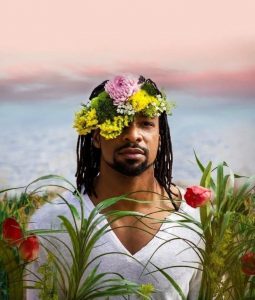LA TRADICIÓN DE JERICHO BROWN – POR ELÍZABETH ECHEMENDÍA

Un libro imperdible que, con suma destreza, nos coloca frente al trauma. La tradición, de Jericho Brown, fue escrito a modo de sutura con hilo catgut negro; perfora —ppppp—, rompe, perfora, ciñe y espera. Tuve que exhalar profundamente.
An essential book that, with surpassing skill, places us in front of trauma. The tradition, by Jericho Brown, was written as a suture with black catgut thread; pierce —ppppp—, break, pierce, girdle and wait. I had to exhale deeply.
Aquí algunos retazos del libro.
Here are some snippets from the book.
I
Mi primer amor conducía un automóvil Burdeos.
Era rápido y temible, alto como mi padre.
Inmutable y temible, mi alto padre
golpeaba tan fuerte como una tormenta de hielo. Dejaba marcas.
La lluvia ligera golpea suavemente pero deja su propia marca
como el sonido del llanto de una madre una vez más.
Como el sonido de mi madre llorando una vez más,
no hay ningún latido que termine en el lugar donde empieza.
(…)
My first love drove a Burgundy car.
He was fast and awful, tall as my father.
Steadfast and awful, my tall father
Hit hard as a hailstorm. He’d leave marks.
Light rain hits easy but leaves its own mark
Like the sound of a mother weeping again.
Like the sound of my mother weeping again,
No sound beating ends where it began.
II
No quiero dejar un desagradable cadáver
atiborrado de medicinas rendidas al sol.
Algunas de mis medicinas se rinden al sol.
Algunos de nosotros no necesitamos el infierno para ser buenos.
Los que más anhelan, necesitan el infierno para ser buenos.
¿Cuáles son los síntomas de vuestra enfermedad?
He aquí un síntoma de mi enfermedad.
Los hombres que me aman son los que me echan de menos.
I don’t want to leave a messy corpse
Full of medicines that turn in the sun.
Some of my medicines turn in the sun.
Some of us don’t need hell to be good.
Those who need most, need hell to be
good.
What are the symptoms of your sickness?
Here is one symptom of my sickness:
Men who love me are men who miss me.
III
Aster. Nasturtium. Creímos
que los dedos en el polvo querían decir
que ese polvo era nuestro, aprendimos
los nombres en el fuego, en los elementos que los filósofos
clásicos decían que podían transformarnos. Lirio.
Flor dedalera. El verano parecía florecer contra la voluntad del sol, del que las noticias dijeron que calentaba más este planeta que cuando nuestros padres muertos se limpiaban el sudor del cuello. Flor del cosmos. Velo de novia.
Aster. Nasturtium. Delphinium. We thought
Fingers in dirt meant
it was our dirt, learning
Names in heat, in elements classical
Philosophers said could change us. Stargazer.
Foxglove. Summer seemed to bloom against the will
Of the sun, which news reports claimed flamed hotter
On this planet than when our dead fathers
Wiped sweat from their necks. Cosmos. Baby’s Breath.
IV
Alguna gente necesita la religión. ¿Yo?
Yo tengo mi largo pelo negro. Retuerzo
las raíces y las trenzo con fuerza. Tú eres
mi villano. Eres un padre duro, por
detrás, se queja, anudado y recogido,
intocable. Entonces llega
la noche
Some people need religion. Me?
I’ve got my long black hair. I twist
The roots and braid it thought. You’re
My villain. You’re a hard father, from
Behind, it whines, tied and tucked,
Untouchable. Then comes
The night
V
MUSLOS Y CULO
sí, sabía que la carne atraería a los hombres,
y que la carne bien colocada llevaría
a alguien a pensar que podría —cuando huyera de lo que esnifa para matarnos—
subirse a mi espalda con la confianza de que puedo
llevarlo a una gran velocidad y una larga distancia,
y creer, creer que
cuando tiene hambre, yo soy capaz
de saltar para robar
la fruta del árbol
en el que nos paramos para escondernos detrás
y alimentar, alimentarlo.
THIGHS AND ASS
Yes, I knew meat would lure men,
And flesh properly placed will lead
One to think that he can—when
He runs from what sniffs to kill us—
Mount my back trusting I may carry
Him at a good speed for a long distance,
And to believe, believe that
When he hungers, I am able
To leap high, snatch
The fruit of the tree
We pause to hide behind
and feed, feed him.
La tradición fue el libro ganador del premio Pulitzer 2020.
The tradition was the winner of the 2020 Pulitzer Prize for poetry.
Editorial Valparaíso Ediciones.
Reseña y selección literaria por la poeta y escritora Elízabeth Echemendía @eliechemendia
Review and literary selection by Elízabeth Echemendía, poet and writer @eliechemendia
Traducción al español por Nieves García Prados y Andrea Cote
Spanish translation by Nieves García Prados and Andrea Cote


